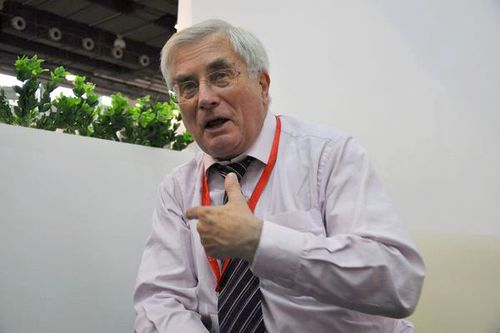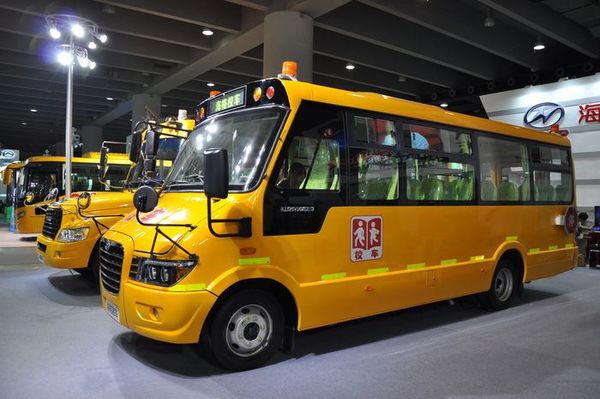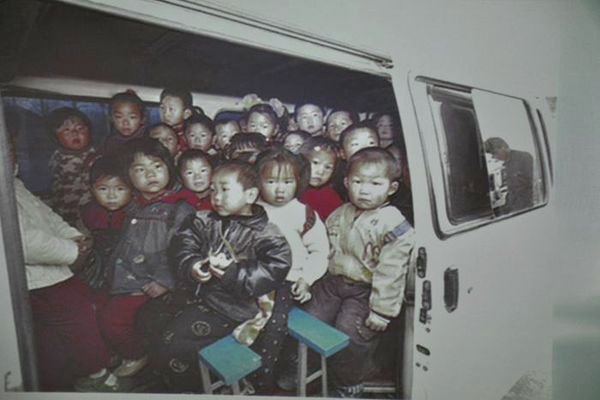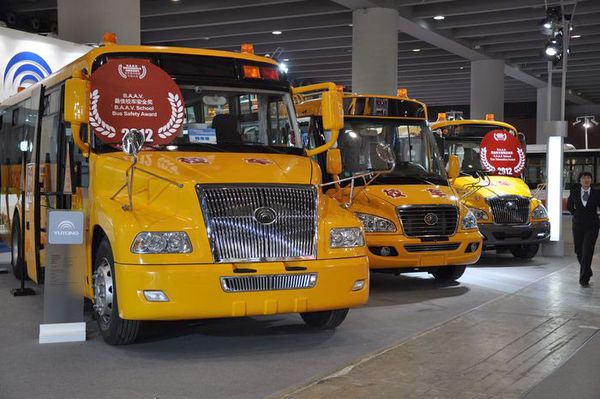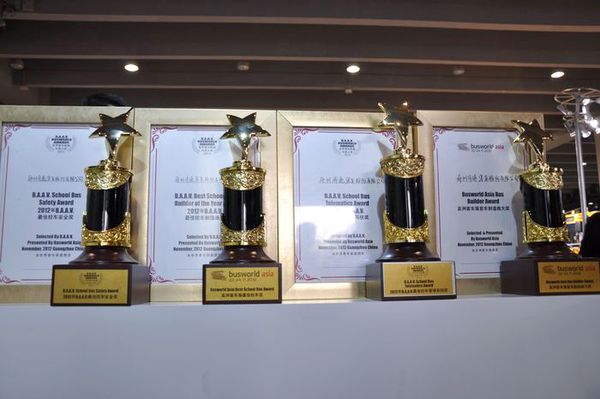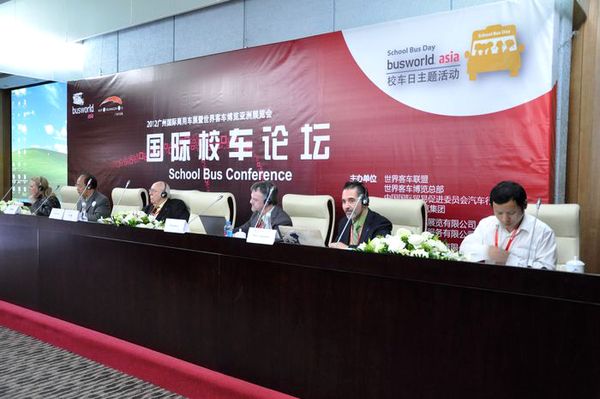 |
|
|
|
What's the word on the bus?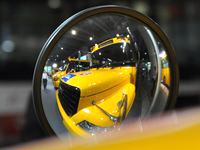
18.12.2012 — Analysis Children, the weather, soccer. People talk about politics and family matters, they meet up and say goodbye on the bus. Sometimes, people are even born or die on board. A bus is a mirror of human life, and in the same way BusWorld mirrors the developments in the bus industry. Silver-haired Luc Glorieux, of Belgium, takes the bus from the suburbs into Brussels. He could drive or take the train, but he rides the bus. The simplest explanation for that, of course, would be that he's also the founder of BusWorld. But that's not it. Luc is just a sensible European. He doesn't want the environment to suffer because of the exhaust from his car - he has to breathe that air himself, after all. He doesn't want to waste his time behind the wheel - he likes to be able to watch the scenery. The train station is too far from his house, while the bus passes right through his town as it collects passengers headed for Brussels from convenient bus stops.
We're sitting with Luc in the press office of BusWorld Asia-2012 and he is contemplating an answer to my question, "Why is bus production so underdeveloped in Russia?" It's a provocative question. I know the answer myself. But I what to hear how the ever-diplomatic Luc will choose his words to express the fact that it's simply not needed. This is my second year as an observer at BusWorld. But despite everywhere all over the world I have traveled by bus, I have never before thought to wonder about the global magnitude of the world of the bus. Who rides the bus? Poor Africans, middle-class Europeans, and wealthy soccer players all over the world. Yes, of course! The world's soccer stars arrive to the Champions League matches on club buses. So they're also part of this world, this world of buses. BusWorld is a unique institution, born 40 years ago. It was a completely different world back then - the Old World stayed within its borders, confined to its own historical development and world view. There was a Cold War and no Internet. Back then, lanes specially marked for buses were placed on European city streets, and buses themselves were more than mere means of transportation. Twelve years ago BusWorld crossed the boundaries of Europe. And today we can point to the results of its journey, at least in China, where twelve editions of the exhibition have been held, dedicated to the achievements of the bus. Luc Glorieux is an idealist. Perhaps even a socialist. Speaking at the opening of BusWorld Turkey this spring, he claimed that the bus is an instrument of equality. Buses grant freedom of movement to even the poorest on our planet. They can travel to the city for work even from remote villages, or visit relatives, or escape armed hostilities in their area. It's true, most of the earth's inhabitants ride the bus at least once in their lives. And many have their first introduction to buses in childhood. Unexpectedly, yet quite naturally, the founding fathers of BusWorld have focused their attention on children. Their ideas are in some ways reminiscent of the colors of the rainbow. Until recently green was the color of the hour. Europe wasn't the only place to successfully develop an all-electric city bus. Otokar presented its first in Istanbul this spring, and then Jiangsu offered up its Alfa Bus this fall in Guangzhou. But it was the color yellow that dominated the exhibit that ran from Nov. 22-24 in this southern Chinese city. Beginning with BusWorld Asia-2012, school buses will have the place of honor at every BusWorld exhibition - including in Belgium, Russia, India, Turkey, and China.
The whole world associates yellow school buses with the United States. Surprisingly, they have no counterpart even in Belgium. And security issues, in addition to the special status granted to buses full of children on the roads, provoke serious public squabbles in Europe. But what about in the developing world? This conference of experts and consumers, the first of its type in the history of BusWorld, showed photos of Chinese villages.
You can watch how two dozen schoolchildren are packed into a truck or minivan in India and Latin America. In Russia, of course, the situation is not so grim, but one could hardly call rural school buses modern. In Guangzhou it's clear that China has made a real breakthrough in the last decade. Buses made by Yutong and Higer converged at the site of the Canton Fair in a well-matched rivalry, looking like they were fresh from the streets of New York. American-style buses are captivating with their power, their garlands of warning lights, active and passive safety system, and comfortable interiors.
Competition in a Chinese-style capitalist system will help Yutong in its battle for preeminence, not only nationally or throughout Asia, but even globally. According to BusWorld, the company currently has the best experimental center in the world, which is how it could gain the upper hand on all continents in the future.
In Guangzhou the jury split the palm of victory. Higer and Yuotong's triumph is largely due to government policy. Get ready for a big number. $72.7 billion. That's what the Chinese government will spend buying school buses over the next 10 years. That equals about 2.2 trillion rubles. Or 220 billion rubles a year. All of Russia's planned educational expenditures combined for 2013 come to 597 billion rubles. Here one sees the difference. "The future of the school bus is the future of China," confidently claimed the founder of the US National School Bus Safety Week, Dick Fischer. Mr. Fischer, a professional with fifty years of experience, knows what he's talking about. China is adroitly solving its many different challenges. Manufacturing tens of thousands of school buses every year is a guarantee of jobs, the development of the national infrastructure, and, of course, a sign of Chinese concern for the safety of its younger generation. And after this who will be the first to throw a stone at the Middle Kingdom? The energetic, creative team at BusWorld has spared no efforts over the past 12 years as they have facilitated the development of the Chinese bus industry. None of the exhibition venues, even in BusWorld's native city of Kortrijk, Belgium, can boast of such an impressive yearly spectacle. But BusWorld Asia has done it. Only now has the decision been made to shift to the two-year cycle of exhibitions in China that seems ordinary to everyone else. In Guangzhou another important decision was made. Now each BusWorld exhibition will be accompanied by a conference, where producers will meet up with experts from the consumers' camp. The discussion in China was important both for manufacturers as well as for teachers, who each day at school await the arrival of healthy, unharmed children.
On the whole, one senses that BusWorld has not strayed from its accustomed terrain. What is this - an exhibition of technical accomplishments? But it attracts only a fraction of the visitors who flock to auto shows to see the latest from Bugatti, Aston Martin, and Rolls-Royce. It's another matter that $500,000 cars can transport only a couple of people, while hundreds of millions ride buses. BusWorld = BusPeople. For this reason there should be a much broader discussion of buses. Clearly the time has come when the world's environmental, demographic, and economic problems need to be seen through the window of a bus, which offers a large, panoramic view of events and occurrences, not the mere fragments visible from the windows of a limousine. In 2013 BusWorld will exhibit at two different venues - in Mumbai (India) in February and Kortrijk in October. One must assume that next year will determine whether China's metamorphoses hold promise for the global bus industry. Vadim Dynin, RusBusinessNews |
| Regions | Project participants | Investment projects | Consulates and Trade Offices | News and Analysis | About the Project |
|
© RusBusinessNews, 2009. All rights reserved. Establishing a hyperlink to RIA RusBusinessNews is required for using any of the material published on this website. News and analytical reviews are translated into foreign languages by the TRANSLIT Translation Agency |
«Sum of technologies»® Web design Site promotion |
